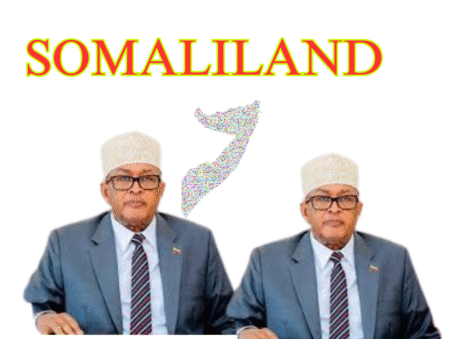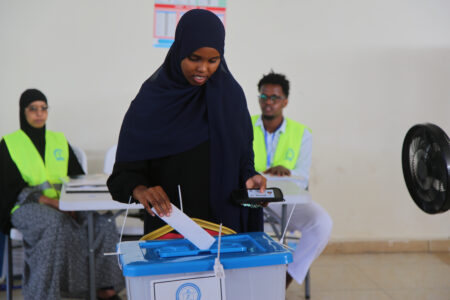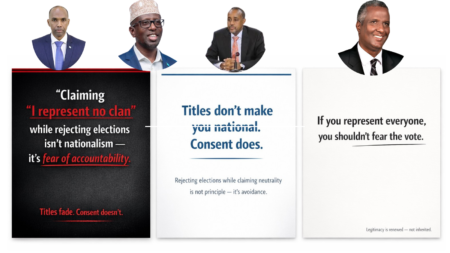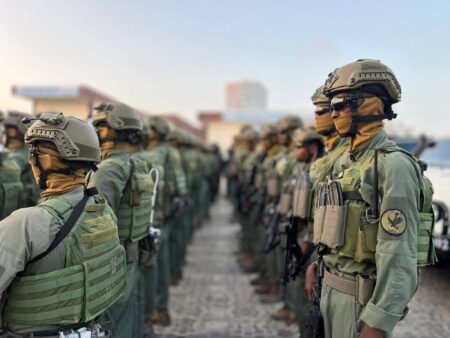In the volatile and complex landscape of Somali politics, the prospect of extending President Hassan Sheikh Mohamud’s term has sparked significant debate among Somali elites. However, considering the ongoing struggle against Al Shabab and the crucial need to rebuild Somali institutions, extending his presidency emerges as a strategic necessity according to civil society and much of Somali public opinion.
Continuity in Leadership is Key
Frequent leadership changes can impede progress in fragile states with precarious political stability. The current four-year term for the President of Somalia, half of which has already passed, may be insufficient to make substantial gains in rebuilding the nation, particularly when facing the dual challenges of terrorism and institutional fragility. President Hassan Sheikh has demonstrated a committed and strategic approach to combating Al Shabab, and extending his term could provide the continuity needed to sustain and enhance these efforts.
Progress Against Al Shabab
Under President Hassan Sheikh’s astute leadership, Somalia has made significant strides in the fight against Al Shabab and Ethiopian’s aggression of land annexation . However, the terrorist group remains a formidable threat. Eliminating such a profoundly entrenched organization requires sustained and consistent efforts. Frequent leadership changes disrupt these efforts, as new administrations need time to adjust and implement their strategies. By extending President Hassan Sheikh’s term, Somalia can maintain momentum in its fight against Al Shabab, ensuring that strategy and operations are not interrupted. The rehabilitation centers for Al Shabab returnees are overflowing, and the government is striving to raise additional revenue to cover the increasing costs. These successes, coupled with Al Shabab’s loss of significant territories in Gal-Mudug and Hirshabelle states, demonstrate the effectiveness of President Hassan Sheikh’s financial pressure on the group.
Institutional Rebuilding
Rebuilding a nation’s institutions after decades of conflict is a monumental task. President Hassan Sheikh has initiated the review process for the Somali constitution and prioritized legislation on investment, resource sharing, judiciary, education, and security infrastructure. These efforts require long-term and focused efforts to reform and strengthen. Extending his tenure would allow for the continuity necessary to see these reforms to fruition, ensuring that the foundations being laid now are solidified and built upon.
Implementation of Advisory Committees
Establishing non-payroll advisory committees to collect public opinions and provide diverse input is crucial. These committees, free from governmental payrolls, would offer unbiased advice and analyses, ensuring that the president can access a broad spectrum of perspectives. This process would involve public consultations and open forums, allowing citizens to directly contribute to decision-making. One committee should focus on analyzing the war against Al Shabab, identifying gaps in current strategies, and providing insights on addressing these issues. This would help refine the approach to combating terrorism and convince the public of the necessity of a presidential extension by demonstrating a transparent and participatory process. A committee dedicated to monitoring economic stability and development should also be created. This committee would oversee and analyze economic policies, ensuring they are practical and aligned with long-term national recovery and growth goals. Their independent status would foster a more objective and credible evaluation process.
Reforming the Electoral Process
The current indirect electoral process, where elders choose electors who elect parliamentarians and the president, must be more inclusive to reduce corruption. Transitioning to a more inclusive electoral system requires time and careful planning. Parliament must pass new legislation to establish an independent election commission to oversee the process and ensure its integrity. Extending President Hassan Sheikh’s term would provide the necessary time for parliament to perform its duties without rushing, ensuring that new election laws are well-considered and effective.
Legislative Demands and Time Constraints
Parliament faces the significant task of passing new election laws. Parliamentarians are under a strict schedule, given the complexity of electoral reform and the need for thorough debate and consensus-building. Extending the presidential term would provide the necessary time for parliament to perform its duties without rushing, ensuring that new election laws are well-considered and effective. This legislative diligence is crucial for building a robust and fair electoral system that can sustain Somalia’s democracy in the long term.
Economic Stability and Development
Economic recovery and development are crucial for Somalia’s future stability. President Hassan Sheikh’s administration has been working on improving economic conditions, attracting foreign investment, and creating jobs. However, monetary policies and development projects need time to yield tangible results. A prolonged leadership period would enable the implementation of long-term economic strategies, fostering an environment of stability and growth essential for reducing extremist groups’ appeal and ensuring sustainable development.
International Relations and Support
The international community’s role in Somalia’s recovery cannot be overstated. President Hassan Sheikh has successfully established relationships with key global partners, securing aid and support crucial for Somalia’s development. An extension of his presidency would reinforce these relationships, reassuring international stakeholders about Somalia’s commitment to stability and progress. Frequent leadership changes can lead to uncertainty and reluctance from international partners, potentially jeopardizing ongoing and future support.
Finally
Somalia stands at a critical juncture. The fight against Al Shabab and the rebuilding of national institutions require robust strategies and the continuity of leadership to implement them effectively. Extending President Hassan Sheikh Mohamud’s term would provide stability and consistency, allowing him to build on the progress made and ensure that Somalia is on a sustainable path to recovery and development. Implementing non-payroll advisory committees would further enhance the effectiveness of his presidency by incorporating diverse perspectives and ensuring transparency. Moreover, the time needed for electoral reforms and the passage of new election laws necessitates stable leadership to see these changes through effectively. In this context, extending his term is not just a political maneuver but a strategic decision for the nation’s future.





